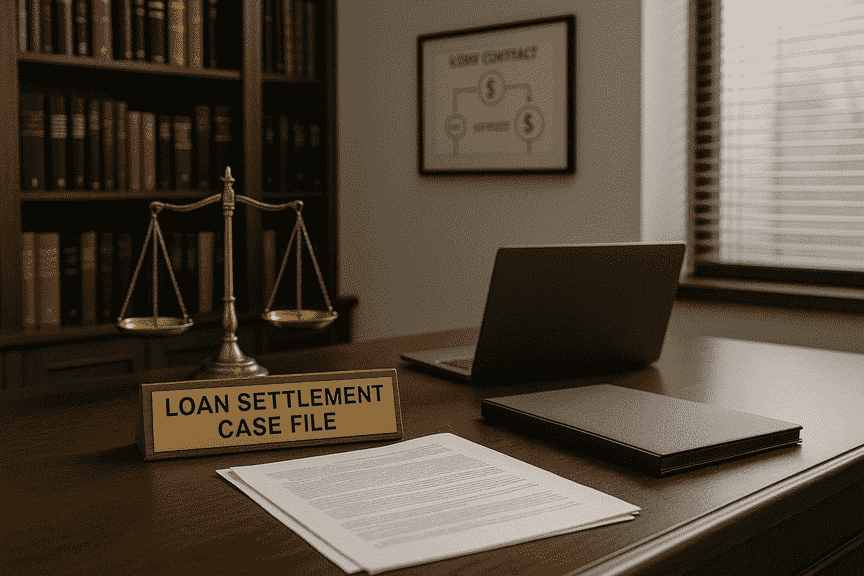
How to Settle a Personal Loan If I Can’t Repay the Full Amount
Introduction
Borrowing is common. Settling what’s borrowed sometimes that’s where the trouble begins. In India, personal loans are easy to obtain but tough to manage when circumstances change. A stable income may stop, family expenses may rise, or a medical emergency may wipe out savings. Repaying the full loan amount becomes difficult.
When borrowers default, they often face relentless calls, notices, and legal threats. But there is a structured way to end this loan settlement. This doesn’t erase the past, but it officially closes the loan through a mutual understanding between borrower and lender.
What Does Loan Settlement Really Mean?
It’s not a discount. It’s not forgiveness either. It’s a legal agreement. The bank agrees to accept a lump sum amount that is less than the total outstanding, and in return, the loan is marked as “settled.” This is different from a “closed” status.
A closed loan means all dues were paid as agreed. A settled loan shows that part of the dues were written off after an understanding. It helps stop legal and recovery action, but it comes with a mark on your credit history.
When Do Banks Consider Settling a Loan?
Lenders don’t offer settlements lightly. They usually consider it when:
- The borrower has missed several EMIs
- The account is about to be, or already is, a Non-Performing Asset (NPA)
- There’s documented financial distress job loss, illness, family crisis
- Legal recovery would cost more than what can realistically be collected
Banks weigh the risk and decide whether partial recovery is better than nothing. The decision depends on the case details and the borrower’s willingness to cooperate.
How the Process Usually Works
Here’s a plain breakdown:
- Loan defaults begin – You miss payments for over 90 days
- Bank calls or sends notices – First from internal teams, then from recovery agents
- You explain your situation – Often with proof of financial difficulty
- Bank reviews and offers a figure – A reduced amount, payable in a single transaction
- You accept and pay – The payment is made via cheque, DD, or transfer
- Bank issues a ‘no dues’ letter – And updates your loan status as “settled”
- Credit report reflects the change – CIBIL and others are informed by the bank
This entire process is documented. No verbal promises. Only paper.
Documents You Will Need or Receive
If you go through a settlement, you’ll deal with several documents:
- Settlement offer letter – Sent by the bank with the proposed final amount
- Payment acknowledgment – After you deposit the agreed sum
- No dues certificate – This proves the bank has closed the case
- Account statement – Showing updated status as “settled”
- Credit report changes – Typically updated within 30–60 days
All documents must be preserved for future reference, especially if any legal issue or credit inquiry arises later.
Impact on Your Credit Record
Settling a loan won’t help your credit score. It marks your profile with a tag that says you didn’t pay back fully. Even though the bank closed the case, the record stays on file with credit bureaus for up to seven years.
This can limit your ability to get fresh loans, lower your credit card limit, or result in rejections when you apply for housing or vehicle finance.
Is Settlement the Same as Restructuring?
No. Here’s the difference:
- Settlement means the loan ends after the bank accepts a part of the due amount. It’s closed, but the rest of the money is written off.
- Restructuring means the bank changes the repayment terms you pay later, or in smaller installments, but the total due doesn’t change.
Restructuring is better for credit health. Settlement should only be considered when full repayment isn’t possible, and recovery is not practical.
One Case Example
Rohit, a salaried employee in Lucknow, took a personal loan of ₹3,00,000. He paid EMIs for 8 months, but after a major surgery, he was on unpaid leave. By the time he resumed work, the loan had turned into a legal problem.
He reached out to the lender and submitted his hospital bills, pay stubs, and letters from his HR department. The bank reviewed his case and offered a full and final settlement of ₹1,90,000. He paid it within a week.
Two weeks later, the bank sent him a no dues certificate. CIBIL showed the loan status as “settled.”
How Courts View Settlement Agreements
In India, once a bank and a borrower sign a full and final settlement agreement and the borrower pays as agreed, the case is considered closed.
Courts do not allow banks to reopen settled cases unless there is fraud or dishonesty involved. These agreements are treated as valid contracts under the Indian Contract Act.
Banks are also required to update credit records, and cannot legally pursue the borrower again for the unpaid balance if a formal settlement has been signed and cleared.
When Legal Help Becomes Necessary
If recovery agents show up at your door, call your workplace, or make threatening remarks, the borrower has the right to legal protection. RBI rules prohibit abusive recovery tactics.
Legal professionals help when:
- You receive court notices
- Bank recovery agents harass or pressure you
- The settlement terms aren’t clear
- The bank refuses to give documentation after payment
What Legals365 Does in These Situations
Legals365 is a law firm that assists borrowers caught in financial disputes. Their services include:
- Examining loan terms and overdue accounts
- Drafting response letters to banks and NBFCs
- Communicating directly with legal teams from the lender
- Negotiating for better or fairer settlement amounts
- Securing all paperwork, including no-dues letters
- Ensuring credit updates and closure follow RBI norms
They offer protection from harassment, legal errors, or missing documents that could haunt a borrower later.
Conclusion
Loan settlement isn’t a win. But it’s a resolution. It provides closure to a stressful financial chapter, especially when repayment is out of reach. The tag “settled” doesn’t mean forgiven it means finalized, with consequences.
However, when done with care, and with the right documents in hand, the process helps borrowers move forward. With legal guidance, especially from teams like Legals365 and Online Noida borrowers can complete this process with dignity, legality, and peace of mind.
Hashtags
#LoanSettlementIndia #LoanClosureLegal #NoDuesCertificate #PersonalLoanHelp #BorrowerRightsIndia #DebtReliefLegal #Legals365Support #LoanStatusClosure #CreditScoreSettlement #FinancialDisputeIndia #LoanResolutionHelp #LoanNegotiationIndia #CIBILUpdateLoan #inalLoanSettlement #LegalHelpLoanDefault #OnlineNoida
